|
|
|
Sort Order |
|
|
|
Items / Page
|
|
|
|
|
|
|
| Srl | Item |
| 1 |
ID:
161259
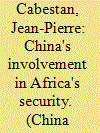

|
|
|
|
|
| Summary/Abstract |
China has been much more involved in Africa's economy and trade than in its security. However, over the past decade or so, China has increased its participation in the United Nation's Peacekeeping Operations (UN PKOs), particularly in Africa. It has also taken steps to better protect its overseas nationals and, in 2017, established a naval base in Djibouti. This article focuses on the participation of China's People's Liberation Army in the United Nation's Multidimensional Integrated Stabilization Mission in Mali (MINUSMA) since 2013. It aims to unpack the diplomatic process that led China to take part in this mission and to analyse the form of this participation. Mali was the second time (the first being in South Sudan in 2012) that China opted to deploy combat troops under the UN banner, underscoring a deepening involvement in PKOs and an increasing readiness to face risks. Finally, this article explores the implications of China's participation in the MINUSMA for its foreign and security posture as a whole. Often perceived as a realist rising power, by more actively participating in UN PKOs China is trying to demonstrate that it is a responsible and “integrationist” great power, ready to play the game according to the commonly approved international norms. Is this really the case?
|
|
|
|
|
|
|
|
|
|
|
|
|
|
|
|
| 2 |
ID:
161265


|
|
|
|
|
| Summary/Abstract |
Although current studies into Chinese food supply and quality provide explanations for the causality of food problems, there is limited inquiry into the role of the county government. This is a serious omission for two main reasons: first, because county governments perform a key role in providing support for farmers through agricultural extension services and farmers’ cooperatives, and second, because county-level administrative divisions are central to developing novel instruments to manage supply chain relationships, such as food production standards. We investigate the key players involved in standard making and delivery at the county level. We also analyse how and why the county government engages in standard-setting activities. We use Lin'an's bamboo shoot production industry as a case study to understand how the local state implements “hazard-free,” “green” and “forest food” production standards. The paper concludes that traditional conceptualizations of the local state do not sufficiently address how nature, knowledge of standards and state authority co-produce institutional capacity to control food supply and quality in China. In practice, the local state engages with non-state actors to achieve superficial environmental efforts, such as developing food production standards to throw a “green cloak” over a productivist model.
|
|
|
|
|
|
|
|
|
|
|
|
|
|
|
|
| 3 |
ID:
161260


|
|
|
|
|
| Summary/Abstract |
Most analyses of China's foreign and security policies treat China as a unitary actor, assuming a cohesive grand strategy articulated by Beijing. I challenge this conventional wisdom, showing how Chinese provinces can affect the formulation and implementation of foreign policy. This contributes to existing research on the role of subnational actors in China, which has focused on how they shape domestic and economic policies. Using Hainan and Yunnan as case studies, I identify three mechanisms of provincial influence – trailblazing, carpetbagging, and resisting – and illustrate them with examples of key provincial policies. This analysis provides a more nuanced argument than is commonly found in international relations for the motivations behind evolving and increasingly activist Chinese foreign policy. It also has important policy implications for understanding and responding to Chinese behaviour, in the South China Sea and beyond.
|
|
|
|
|
|
|
|
|
|
|
|
|
|
|
|
| 4 |
ID:
161261
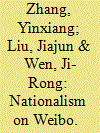

|
|
|
|
|
| Summary/Abstract |
It appears that nationalism has been on the rise in China in recent years, particularly among online communities. Scholars agree that the Chinese government is facing pressure from online nationalistic and pro-democracy forces; however, it is believed that of the two, nationalistic views are the more dominant. Online nationalism is believed to have pushed the Chinese government to be more aggressive in diplomacy. This study challenges this conventional wisdom by finding that online political discourse is not dominated by nationalistic views, but rather by anti-regime sentiments. Even when there is an outpouring of nationalist sentiment, it may be accompanied by pro-democracy views that criticize the government. By analysing more than 6,000 tweets from 146 Chinese opinion leaders on Weibo, and by decomposing nationalistic discussion by specific topic, this study shows that rather than being monolithically xenophobic, nationalists may have differing sets of views regarding China's supposed rivals. Rather than being supportive of the regime, nationalists may incorporate liberal values to challenge the government. Nonetheless, this liberal dominance appears to provoke a backlash of nationalism among certain groups.
|
|
|
|
|
|
|
|
|
|
|
|
|
|
|
|
| 5 |
ID:
161262


|
|
|
|
|
| Summary/Abstract |
Guided by Michel Foucault's concept of “pastoral power,” this article examines the ways in which contemporary discourses within official narratives in China portray the state in a paternal fashion to reinforce its legitimacy. Employing interdisciplinary approaches, this article explores a number of sites in Urumqi, the regional capital of the Xinjiang Uyghur Autonomous Region (XUAR), in order to map how a coherent official narrative of power and authority is created and reinforced across different spaces and texts. It demonstrates how both history and the present day are depicted in urban Xinjiang in order to portray the state in a pastoral role that legitimates its use of force, as well as emphasizing its core role in developing the region out of poverty and into “civilization.”
|
|
|
|
|
|
|
|
|
|
|
|
|
|
|
|
| 6 |
ID:
161059
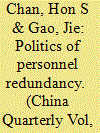

|
|
|
|
|
| Summary/Abstract |
This study provides an overview of the origin, importance and strength of the non-leading cadre system and argues that the system plays a key role in building resilience in China's bureaucracy. The non-leading cadre system is administratively and politically important because it makes the party-state bureaucracy more adaptable and fosters cohesion among the elite cadre workforce. Although the system may appear to have institutionalized redundancy, this study argues that this redundancy has the benefit of making movement between leading and non-leading cadre status possible. In other words, the non-leading cadre system provides the various levels of the party-state bureaucracy with the leverage to develop their own measures for resolving their own problems. Putting aside the deficiencies in implementation, the non-leading cadre system is likely to remain durable and will help to develop an agile and resilient personnel management system, at least in the short to medium term.
|
|
|
|
|
|
|
|
|
|
|
|
|
|
|
|
| 7 |
ID:
161058


|
|
|
|
|
| Summary/Abstract |
This paper provides an analytical review of the social science literature on guanxi. The focus of this review is on the prevalence and the increasing significance of guanxi during China's post-1978 reforms, which were implemented to move the country towards a market economy. Since then, researchers have engaged in debates on what guanxi actually means to Chinese people in the past and today, how it has been adaptive to ongoing institutional transformations, and why its influence in economic, social, and political spheres can stabilize, increase or decrease with market reforms and economic growth. The author provides a synthesis of these debates before offering a theoretical framework which provides an understanding of the dynamics of guanxi through the changing degrees of institutional uncertainty and market competition. Survey findings on the increasing use of guanxi in labour markets from 1978 to 2009 are presented to illustrate the usefulness of this framework. In the conclusion, the author argues that guanxi is a five-level variable, and that the nature and forms of guanxi influence are contingent upon whether guanxi is a tie of connectivity, a sentimental tie, a sentiment-derived instrumental tie, an instrumental-particular tie, or an obligational tie that facilitates power and money exchanges. This five-level conceptualization is aimed at advancing future scholarship of guanxi in China's rapidly changing society.
|
|
|
|
|
|
|
|
|
|
|
|
|
|
|
|
| 8 |
ID:
161258
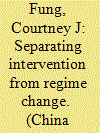

|
|
|
|
|
| Summary/Abstract |
China's response to the recent Syria crisis at the UN Security Council represents a crucial case in China's approach to intervention in that it breaks from China's recent practice of becoming more permissive regarding intervention. Instead, China actively worked to ensure that a firm line was drawn to separate intervention from foreign-imposed regime change. It did so by employing three diplomatic innovations: exercising multiple, successive vetoes; expanding discourse to delegitimize intervention as “regime change” by Western powers; and engaging in norm-shaping of the international community's “responsibility to protect” post-intervention. Together, these three innovations highlight China's desire to firmly separate the intervention norm from that of regime change. Using a variety of primary sources, the article also draws insights from interviews with foreign policy elites in Beijing, New York and New Delhi.
|
|
|
|
|
|
|
|
|
|
|
|
|
|
|
|
| 9 |
ID:
161171
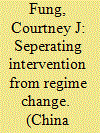

|
|
|
|
|
| Summary/Abstract |
China's response to the recent Syria crisis at the UN Security Council represents a crucial case in China's approach to intervention in that it breaks from China's recent practice of becoming more permissive regarding intervention. Instead, China actively worked to ensure that a firm line was drawn to separate intervention from foreign-imposed regime change. It did so by employing three diplomatic innovations: exercising multiple, successive vetoes; expanding discourse to delegitimize intervention as “regime change” by Western powers; and engaging in norm-shaping of the international community's “responsibility to protect” post-intervention. Together, these three innovations highlight China's desire to firmly separate the intervention norm from that of regime change. Using a variety of primary sources, the article also draws insights from interviews with foreign policy elites in Beijing, New York and New Delhi.
|
|
|
|
|
|
|
|
|
|
|
|
|
|
|
|
| 10 |
ID:
161060


|
|
|
|
|
| Summary/Abstract |
This article analyses the data from the 2010 Chinese General Social Survey (CGSS) to investigate the effects of the New Rural Pension Scheme (NRPS) on people's political trust and policy expectations in China. Results from difference-in-differences (DID) analyses show that those in the NRPS pilot areas reported higher levels of trust in government at both central and local levels than their counterparts in non-NRPS areas, with the former gaining more support than the latter. Moreover, the potential NRPS beneficiaries show similarly higher levels of trust in both central and local governments than non-NRPS beneficiaries. However, the policy did not increase rural residents’ rights consciousness that the government should take the main responsibility for the provision of the old-age support. These findings suggest that citizens' political trust under an authoritarian regime is mainly determined by the material benefits they receive.
|
|
|
|
|
|
|
|
|
|
|
|
|
|
|
|
| 11 |
ID:
161264
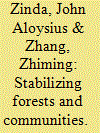

|
|
|
|
|
| Summary/Abstract |
China's recent collective forest tenure reform is intended to clarify and certify forest rights, and thereby promote market circulation of forestland, encourage forestry production and safeguard conservation. Central policy statements prioritize parcelling tenure among households to promote efficient management. This study examines how participants experienced the programme in communities in north-west Yunnan. In the study area, rather than individualizing tenure, forestry agencies compelled communities to re-collectivize forests. Nonetheless, residents persist in using household forests despite restrictions. Local officials tacitly sanction these activities. In mountain hinterlands, forest tenure reform has been focused on “stabilizing” forests and communities. Rather than forcibly impose tenure designs, authorities perform what we call accommodative buffering. A set of formal institutions, rules and mappings enables projects like forest ecological compensation payments to go forward. However, state agents at local and higher levels tolerate informal practices that contain the trouble that poorly fitted formal institutions might cause. While potentially more resilient than by-the-book enforcement, these arrangements could leave residents vulnerable to political shifts that require a demonstration of policy adherence.
|
|
|
|
|
|
|
|
|
|
|
|
|
|
|
|
| 12 |
ID:
161263


|
|
|
|
|
| Summary/Abstract |
This article studies Chinese central government policies in relation to food market building and food security between 1979 and 2008. It investigates major changes in the state's grain purchase pricing, urban subsidized food sales and the state monopoly over rural-to-urban food circulation that were effected in an attempt to ensure both food availability and accessibility under fiscal constraint. By observing the gradual transition from state monopoly to the market, this article traces the mechanisms which enabled the Chinese government to both establish a monopsony by generating artificial price signals for farmers to generate food output, and act as a monopolistic seller by providing subsidized low-priced food to urban consumers in order to fulfil its goal of low-cost industrialization. Thus, China's food security largely hinged on the government's budget to subsidize the price gap. The Chinese government juggled between food security and fiscal affordability to formulate a food budget that would neither excessively impact food security nor cause a crisis to government finance. China's food security puzzle was eventually worked out in the mid-2000s with the boosting of national income, which enhanced the population's access to food and eased the central government's food security concerns.
|
|
|
|
|
|
|
|
|
|
|
|
|
|
|
|
|
|
|
|
|